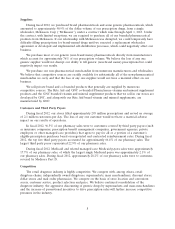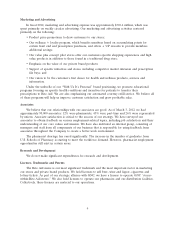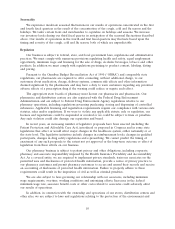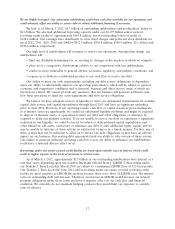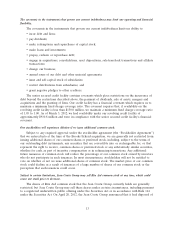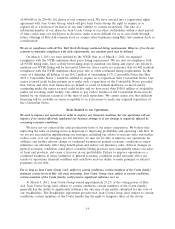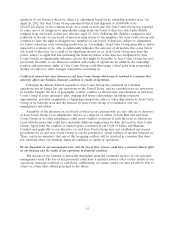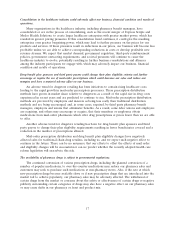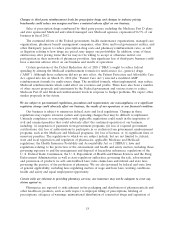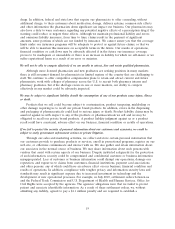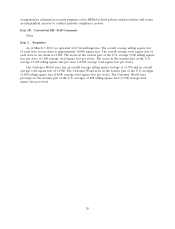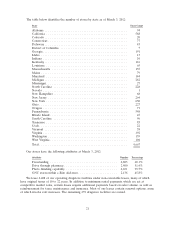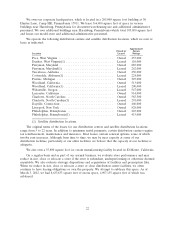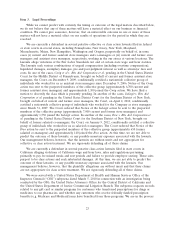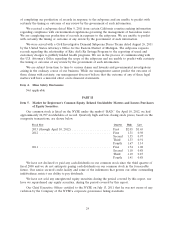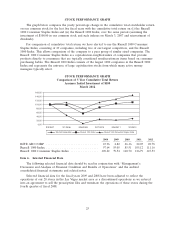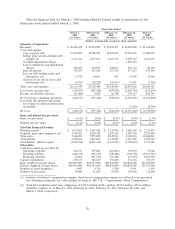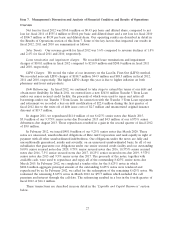Rite Aid 2012 Annual Report Download - page 18
Download and view the complete annual report
Please find page 18 of the 2012 Rite Aid annual report below. You can navigate through the pages in the report by either clicking on the pages listed below, or by using the keyword search tool below to find specific information within the annual report.Changes in third party reimbursement levels for prescription drugs and changes in industry pricing
benchmarks could reduce our margins and have a material adverse effect on our business.
Sales of prescription drugs reimbursed by third party payors, including the Medicare Part D plans
and state sponsored Medicaid and related managed care Medicaid agencies, represented 96.5% of our
business in fiscal 2012.
The continued efforts of the Federal government, health maintenance organizations, managed care
organizations, pharmacy benefit management companies, other State and local government entities, and
other third-party payors to reduce prescription drug costs and pharmacy reimbursement rates, as well
as litigation relating to how drugs are priced, may impact our profitability. In addition, some of these
entities may offer pricing terms that we may not be willing to accept or otherwise restrict our
participation in their networks of pharmacy providers. Any significant loss of third-party business could
have a material adverse effect on our business and results of operations.
Certain provisions of the Deficit Reduction Act of 2005 (‘‘DRA’’) sought to reduce federal
spending by altering the Medicaid reimbursement formula for multi-source (i.e., generic) drugs
(‘‘AMP’’). Although those reductions did not go into effect, the Patient Protection and Affordable Care
Act, signed into law on March 23, 2010 (the ‘‘Patient Care Act’’) enacted a modified AMP
reimbursement formula for multi-source drugs. The modified formula, when implemented, may reduce
Medicaid reimbursements which could affect our revenues and profits. There have also been a number
of other recent proposals and enactments by the Federal government and various states to reduce
Medicare Part D and Medicaid reimbursement levels in response to budget problems. We expect other
similar proposals in the future.
We are subject to governmental regulations, procedures and requirements; our noncompliance or a significant
regulatory change could adversely affect our business, the results of our operations or our financial condition.
Our business is subject to numerous federal, state and local regulations. Changes in these
regulations may require extensive system and operating changes that may be difficult to implement.
Untimely compliance or noncompliance with applicable regulations could result in the imposition of
civil and criminal penalties that could adversely affect the continued operation of our business,
including: (i) suspension of payments from government programs; (ii) loss of required government
certifications; (iii) loss of authorizations to participate in or exclusion from government reimbursement
programs, such as the Medicare and Medicaid programs; (iv) loss of licenses; or (v) significant fines or
monetary penalties. The regulations to which we are subject include, but are not limited to, federal,
state and local registration and regulation of pharmacies; applicable Medicare and Medicaid
regulations; the Health Insurance Portability and Accountability Act or (‘‘HIPAA’’); laws and
regulations relating to the protection of the environment and health and safety matters, including those
governing exposure to and the management and disposal of hazardous substances; regulations of the
U. S. Federal Trade Commission, the U. S. Department of Health and Human Services and the Drug
Enforcement Administration as well as state regulatory authorities, governing the sale, advertisement
and promotion of products we sell; anti-kickback laws; false claims laws and federal and state laws
governing the practice of the profession of pharmacy. We are also governed by federal and state laws
of general applicability, including laws regulating matters of wage and hour laws, working conditions,
health and safety and equal employment opportunity.
Certain risks are inherent in providing pharmacy services; our insurance may not be adequate to cover any
claims against us.
Pharmacies are exposed to risks inherent in the packaging and distribution of pharmaceuticals and
other healthcare products, such as with respect to improper filling of prescriptions, labeling of
prescriptions, adequacy of warnings, unintentional distribution of counterfeit drugs and expiration of
18


